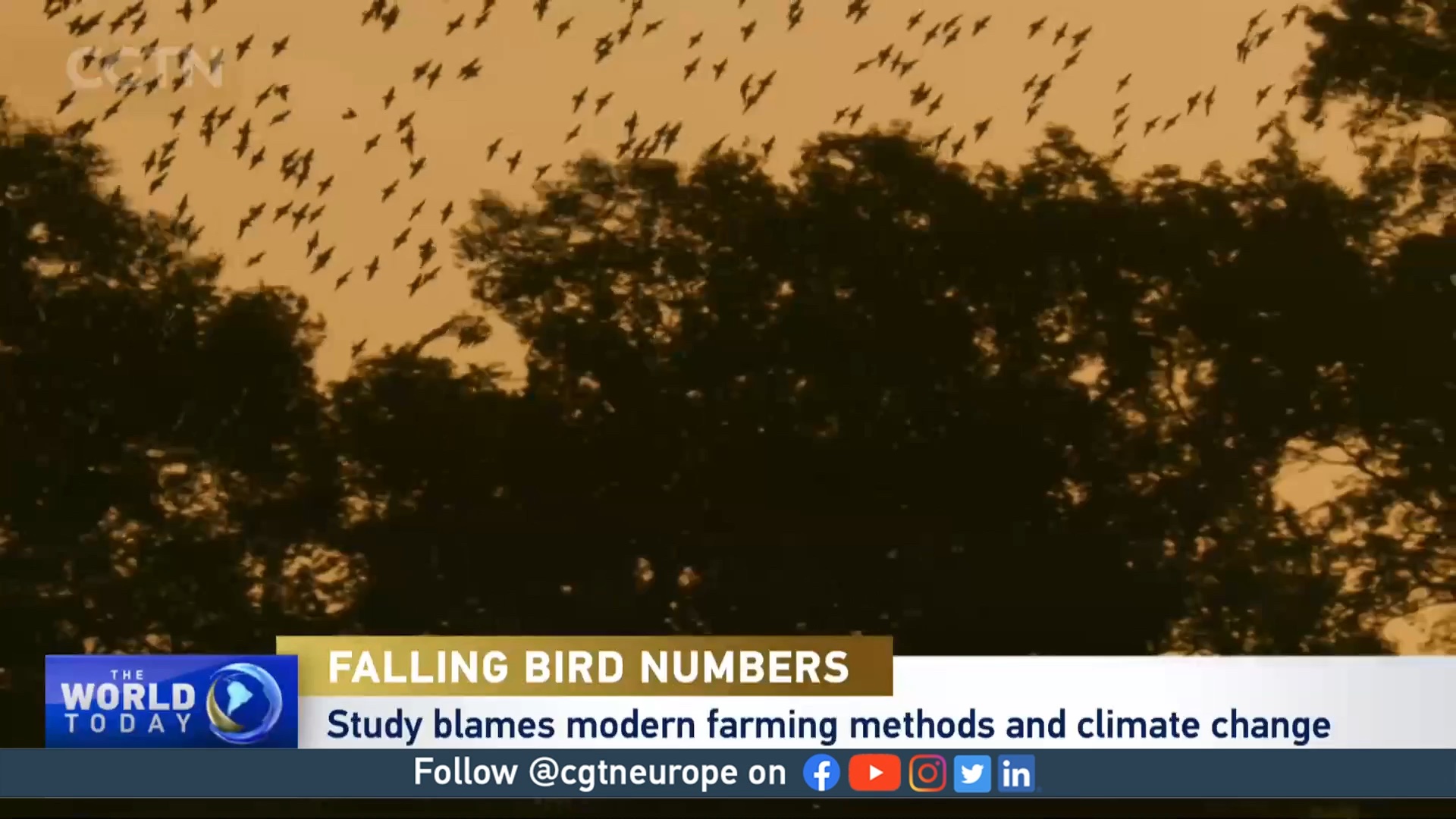02:10

Intensive agricultural use of pesticides and fertilizers is the major cause of a precipitous bird population decline in Europe, according to a new large-scale scientific study.
With an estimated 550 million fewer birds in Europe's skies than in the early 1980s, the report's authors say drastic changes in farming methods are essential.
The study by more than 50 researchers analyzed four decades' worth of data collected by thousands of citizen scientists across 28 countries.
Researchers examined the effects of modern farming methods, urbanization, changes in forest cover, and climate change on 170 common bird species.
The study pinpointed the influence of urbanization and climate change, with the latter partly blamed for numbers of northern, cold-preferring bird species falling at double the rate of warm-preferring, southern species.
But the authors concluded that agricultural intensification, as measured by high pesticide and fertilizer use, was the biggest driver of bird loss.
A leading farmers' group has dismissed the study, published in the Proceedings of the National Academy of Sciences, and point to the industry's efforts to promote biodiversity.
Co-author, Professor Richard Gregory, Head of Monitoring at the RSPB Centre for Conservation Science, told CGTN Europe that farmland species had suffered the largest decline, with numbers plummeting by 56.8 percent. This compared to 27.8 percent of urban dwelling birds and 17.7 percent of woodland birds.

The spotted flycatcher has seen a precipitous decline in numbers. /MPF/Creative Commons
The spotted flycatcher has seen a precipitous decline in numbers. /MPF/Creative Commons
Birds that eat insects, such as swifts and spotted flycatchers, were worst affected, with researchers saying the industrial scale of pest wipeout has caused a "trophic cascade" up the food chain.
"We know that over 80 percent of the birds in the study either feed their young or themselves on invertebrates," said Gregory. "We strongly suspect that the link between modern, intensive farming practices, namely pesticide use, and insect declines is a big driver of bird loss."
Gregory said researchers had conducted "sophisticated analysis, looking at space and time and how bird numbers have changed across 28 countries."
He explained: "Land management underpinned by farming policy since the Second World War has understandably promoted increasing agricultural output, but at a great cost to wildlife - not just to birds but other wildlife and plant communities.

A common Swift flying to its nest. /AlexeySokolov1971
A common Swift flying to its nest. /AlexeySokolov1971
Organic fertilizer plea
Gregory said fertilizers were also problematic. "Fertilizers have deleterious effects because they can change vegetation structures around fields and drift into the river courses," he explained. "High amounts of fertilizer in the environment can lower plant diversity and the abundance of butterflies and insects in those marginal habitats as well."
The study authors have called for greater use of organic fertilizers.
One person who agrees is Sophie Verhagen, one of the head growers for Growing Communities, a London-based social enterprise that sources and distributes organic fruit and vegetables via a subscription 'veg box' scheme.
Verhagen told CGTN: "There are many organic or regenerative farming alternatives that were around before industrialized farming started introducing nitrates. There's this myth that industrial farming is necessary to feed the world that's been peddled by the media and big business."
She added: "Our growers follow organic methods. We try not to dig or disturb the soil and encourage the pollinators, including birds and what we call 'beneficial insects'."
Post-Brexit fears
Gregory fears the situation worsening in the UK's post-Brexit landscape. He said: "There's a real danger that, despite lots of promises of how we might change the land management system to a public money for public goods model, we are moving to increase food output because of concern about food security and the war in Ukraine."
He warned against the UK government – and its European counterparts – making "really bad short-term decisions about land management."
Verhagen believes smaller farms are an essential part of the solution and called on the UK government to help the industry transition to "nature friendly farming."
Gregory agrees. "We're in this nature and climate crisis, so food production must move to a genuinely sustainable model. That needs to involve producers, retailers and consumers.
"We have to work within the grain of nature, such as having flower rich margins and weedy stubble levels and away from a reliance on pesticides and inorganic fertilizers. Giving over as little as 10 percent of farmland to make space for nature can make a huge difference. That's the future and I feel there's real positivity for this within the farming community.”

Spraying fertilizer on the farm is damaging to birdlife, say environmentalists. /Sergei Supinsky/CFP
Spraying fertilizer on the farm is damaging to birdlife, say environmentalists. /Sergei Supinsky/CFP
The UK's largest farmers' organization, the National Farmers' Union (NFU), does not accept the study's findings.
A spokesperson told CGTN Europe: "This doesn't appear to be a particularly robust study and as the report authors themselves admit, the data used about pesticide and fertilizer input is too coarse to draw any firm conclusions.
"The paper talks about how biodiversity decline is accelerating but provides no data to back this up. Alongside producing quality, climate-friendly food, Britain's farmers are the custodians of the great British countryside and are working to boost biodiversity, create habitats for wildlife and provide additional feeding for farmland birds."
But Gregory insists the study has serious implications. "The birds are a real bellwether of environmental health. The study is telling us something profound about the imbalance of our relationship with nature."
Subscribe to Storyboard: A weekly newsletter bringing you the best of CGTN every Friday